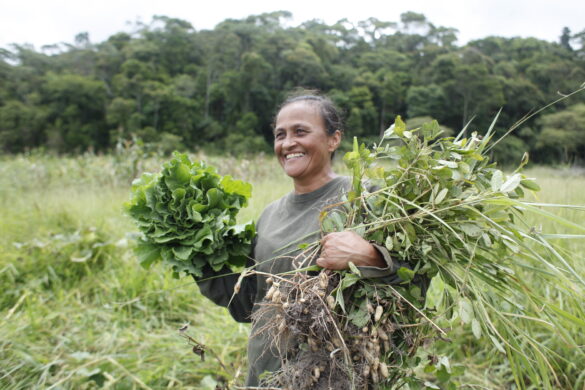In November 2024, Brazil submitted its enhanced Nationally Determined Contribution (NDC) ahead of COP29. Built on the strong integration of ‘Climate Federalism’, Brazil’s pledge sends a clear signal: tackling the climate crisis requires strong partnerships between the national, regional, and local governments.
Collaborating Across all Levels of Government: Rio’s Initiatives for Effective Climate Action
Brazil’s pledge to cut emissions by 59-67% by 2035 and reach climate neutrality by 2050 can only succeed if bold national goals translate into real action on the ground. Brazil’s vision is already taking shape through initiatives such as AdaptaCidades, an innovative programme developed by Brazil’s Ministry of Environment in 2025. Designed to connect the technical expertise, financing, and adaptation tools to cities, AdaptaCidades is already helping more than 50 municipalities and 11 states across Brazil. Yet, the real drivers of transformation are also in how regions and cities take ownership of these goals – Rio de Janeiro, for example, is setting a model for others to follow.
The Ambiente Resiliente framework, established in 2021 by the State of Rio de Janeiro, offers a strategic foundation to all 92 municipalities, equipping them to integrate resilience, risk management, and the Sustainable Development Goals (SDGs) into local policy. This framework not only reinforces national priorities but also connects them with community realities. Building on this work, in 2024, Rio de Janeiro launched the initiative Rio Inclusivo e Sustentável, in partnership with UN-Habitat. Through participatory planning tools such as CityRAP, the initiative empowers municipal leaders and residents to jointly assess risks and co-design targeted solutions. The progress is measured against SDG-aligned indicators.
Climate Federalism in Practice: Learning and Scaling Together
The national initiative AdaptaCidades and Rio de Janeiro’s regional frameworks work hand in hand, showing how national and regional resources and guidance reinforce the work of municipal teams, while practical experience and innovations from municipalities, shape and refine national strategies. These partnerships ensure that environmental policies remain adaptive and continuously improve through shared learning and evidence of what works on the ground.
The alignment between national initiatives and Rio de Janeiro’s regional programs exemplifies Brazil’s approach to Climate Federalism, where national, state and municipal governments collaborate closely to implement climate action. Research by the NewClimate Institute’s 2019 highlights Brazil’s experience: when regional and municipal governments work alongside national policy, they can contribute an additional 2.3 to 4.5% in national emissions reductions by 2030 compared to efforts implemented independently.
Connecting Biodiversity and Climate at Every Level
A similar effort has taken place in the biodiversity sphere. In 2023, the Brazil’s Ministry of Environment, in collaboration with the Association of State Environmental Entities (ABEMA), and the National Association of Municipalities, worked to harmonise the country’s National Biodiversity Strategy (NBSAP) across national, state, and local levels. Through consultations and dialogues with subnational governments, including Rio de Janeiro, this initiative showed the value of integrated planning – connecting conservation efforts across jurisdictions – while also highlighting the continuing need for leadership, capacity, and finance.
The Global Relevance of Brazil’s Multilevel Model
On a global scale, the Global Covenant of Mayors (GCoM) (2021) analyzing data from over 11,000 cities and local governments, finds that well-coordinated multi-level climate action can collectively reduce up to 2.3 gigatonnes (GtCO₂e) of emissions each year by 2030, equivalent to shutting down more than 600 coal-fired power plants for a year, or taking almost 500 million passenger cars off the road. These findings provide concrete evidence that Brazil’s Climate Federalism and multilevel governance can deliver transformative and concrete results.
As Brazil looks ahead to COP30, the experience of Rio de Janeiro highlights a powerful truth for climate leaders everywhere: lasting transformation is only achieved through strong partnerships, where knowledge, resources, and ambition are present across all levels of government. In this model, each project, every lesson learned, and every community voice strengthens national responses – proving that climate ambition delivers its greatest impact when it is shared, coordinated and collectively owned.
More information:
- Rio de Janeiro ‘Resilient Environment Program‘
- Rio de Janeiro State Biodiversity Strategy and Action Plan
Watch the #RegionsVoive video:
About #RegionsVoice: In 2019, Regions4 launched the global campaign #RegionsVoice in a collective effort to bring the voice of regional governments to the major events and negotiation processes in sustainable development within the UN. The aim of the campaign is to ensure the visibility and wider recognition of the role of regional governments in sustainable development, by elevating both individual and collective messages and engaging with a wider audience during the UN Decade of Action.
Photo from Luis Diego Aguilar on Unsplash






